|
|
|
Sort Order |
|
|
|
Items / Page
|
|
|
|
|
|
|
| Srl | Item |
| 1 |
ID:
173459
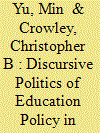

|
|
|
|
|
| Summary/Abstract |
This article explores the discursive functioning of education policies, bringing into consideration community perspectives regarding policy enactment in contemporary China. With the intention of building upon ongoing discussions surrounding both the conceptions and purposes of policy sociology, we critically analyse policies directly related to the education of migrant children living in and around China's largest urban centres, with a specific focus on those implemented in Beijing. We emphasize two important aspects that previous studies of China's education policies have tended to underplay given their focus on social-economic perspectives. The first argument is that education policies have an underlying agenda that extends beyond that of simply addressing the educational needs of migrant children – evidenced through the discursive functions of policy texts. The second argument is related and seeks to raise questions about who is best served by these policies and for whom these policies are intended.
|
|
|
|
|
|
|
|
|
|
|
|
|
|
|
|
| 2 |
ID:
024516
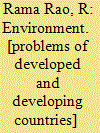

|
|
|
|
|
| Publication |
New Delhi, Economic and Scientific Research Foundations, 1976.
|
| Description |
52p.
|
|
|
|
|
|
|
|
|
|
|
|
Copies: C:1/I:0,R:0,Q:0
Circulation
| Accession# | Call# | Current Location | Status | Policy | Location |
| 023173 | 363.7/RAO 023173 | Main | On Shelf | General | |
|
|
|
|
| 3 |
ID:
040125
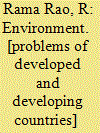

|
|
|
|
|
| Publication |
New Delhi, Economic and Scientific Research Foundation, 1976.
|
| Description |
52p.
|
|
|
|
|
|
|
|
|
|
|
|
Copies: C:1/I:0,R:0,Q:0
Circulation
| Accession# | Call# | Current Location | Status | Policy | Location |
| 016765 | 363.7/RAO 016765 | Main | On Shelf | General | |
|
|
|
|
| 4 |
ID:
116255


|
|
|
|
|
| Publication |
2012.
|
| Summary/Abstract |
Recent research on Palestine, Kenya, and Malaya has emphasised the coercive nature of 'Britain's dirty wars'. Abuses have been detailed and a self-congratulatory Cold War-era account of British counter-insurgency - as 'winning hearts and minds' and using minimum force - subjected to intensifying attack. The result has been a swing from over-sanitised narratives of the primacy of 'winning hearts and minds', towards revisionist accounts of relentless coercion, the narrowly coercive role of the army, and of widespread abuses. This article argues that, if Malaya is anything to go by, the essence of Cold War-era British counter-insurgency victories lay neither in 'winning hearts and minds' per se, nor in disaggregated and highly coercive tactics per se. Rather, it lay in population and spatial control in the which the interaction of both was embedded. In Malaya British tactics during the most critical campaign phases counterpoised punitive and reward aspects of counter-insurgency, in order to persuade people's minds to cooperate, regardless of what hearts felt. This article thus makes the case for avoiding artificial contrasts between 'winning hearts and minds' and a 'coercive' approach, and instead for a new orthodoxy focusing on their roles within the organising framework at play during successful phases of counter-insurgency.
|
|
|
|
|
|
|
|
|
|
|
|
|
|
|
|
| 5 |
ID:
029495


|
|
|
|
|
| Publication |
London, Hutchinson and company., 1978.
|
| Description |
269p.hbk
|
| Standard Number |
009115300X
|
|
|
|
|
|
|
|
|
|
|
|
Copies: C:1/I:0,R:0,Q:0
Circulation
| Accession# | Call# | Current Location | Status | Policy | Location |
| 011902 | 951.05/SNO 011902 | Main | On Shelf | General | |
|
|
|
|
| 6 |
ID:
146230


|
|
|
|
|
| Summary/Abstract |
Since control over the population constitutes the most crucial determinant for victory in irregular warfare, how should a state authority isolate the insurgents (the “fish” in Maoist terms) from the population (the “sea” in which the “fish” thrive)? Should a state authority simply drain the “sea” by diverting its “water” elsewhere? Does the forcible transfer of the local people who support an insurgency truly work? This article studies how the royalist regime of Greece forcibly transferred thousands of villagers (over 10% of the total population) to counter the communist insurgency during the Greek Civil War (1946–1949) and shows whether and how these deportations could be crowned with success.
|
|
|
|
|
|
|
|
|
|
|
|
|
|
|
|
| 7 |
ID:
178163
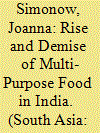

|
|
|
|
|
| Summary/Abstract |
This article traces the transnational history of Indian Multi-Purpose Food (Indian MPF, or simply MPF) to make two contributions to the historiography of development in post-War South Asia. Firstly, it illuminates the involvement of supporters of Indian nationalism in North America, who backed the use of food supplements in India, in the process of mobilising US resources to promote Indian national development in general, and family planning in particular. Secondly, the article sheds new light on the production of development knowledge on food and nutrition in early post-colonial India and the role that food science and technology assumed in national food planning in the first decades after Independence.
|
|
|
|
|
|
|
|
|
|
|
|
|
|
|
|
| 8 |
ID:
190162
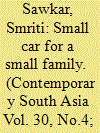

|
|
|
|
|
| Summary/Abstract |
The Maruti Suzuki joint venture between the Government of India and the Japanese Suzuki Motor Corporation in 1983 launched India’s first ‘people’s car’ – the Maruti 800. This article argues that the conceptualisation and promotion of the Maruti 800 as the ideal car for a small, middle class family revealed subtle continuities with the controversial family planning programme of the state which had reached its peak during the internal ‘Emergency’ of 1975. By associating the Maruti 800 – an object of aspiration for an emerging middle class and of at least potential mass consumption – with a small family, the state reiterated its message of population control albeit subliminally. The article further suggests that the adoption of Japanese management practices at Maruti, which laid emphasis on hard work and loyalty to the company-family, was in line with Prime Minister Indira Gandhi’s desire to enforce discipline and enhance labour productivity, a notion also vocalised during the Emergency. Finally, the article illustrates how the ‘people’s car’ project placed the Indian state as the ‘driver’ of middle class aspirations and mobility in 1980s’ India, a full decade before the liberalisation reforms of 1991.
|
|
|
|
|
|
|
|
|
|
|
|
|
|
|
|
|
|
|
|
|